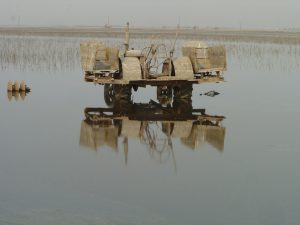Climate Change Mediation For Communities Divided by Flood Barrier Impacts
When large-scale climate change infrastructure divides communities, climate change mediation can
find common ground. Flood barriers are a critical source of protection for communities threatened by
climate change, but they can have disastrous impacts on communities that aren’t protected from
flooding.
A helpful analogy is to think of flood barriers and seawalls in terms of the sandcastles you used to build as a child. Flood barriers are like fortifications around the sandcastle. If you engineer flood barriers to protect your sandcastle, the waters will flow in around your castle, but it will overwhelm the areas around your sandcastle.
How can critical infrastructure like flood barriers protect communities without threatening others?
Communities must find ways to work together. To unilaterally move forward with infrastructural
changes could have a drastic impact. There are few official incentives to get communities to work
together, but the long-term incentives are clear. Climate change mediation can avert protracted legal
conflict and a catastrophic impact on marginalized communities.
Climate Change Mediation through BCS can Help Communities Avoid Catastrophic Damage from
Flooding. Call us today to arrange a free consultation
New modelling by scientists at Stanford University’s Natural Capital Project has painted a frightening
picture of the Bay Area’s potential for flooding. Waters could rise 7 feet in the next 80 years. If San
Jose were to build a flood barrier, the economic damage to adjacent communities like Redwood City
would be $723 million in flood damage after one high tide in the spring.
Another risk to communities unprotected by flooding is the risk that toxic chemicals in shoreline
industrial areas could rise during flooding and contaminate groundwater.
When communities seek out climate change mediation they can discuss working together to protect
larger areas of shoreline. Unfortunately, funding for these projects isn’t equal opportunities. Money is
distributed to bigger municipalities, regardless of risk. A common pot of money doesn’t exist that can
incentivize communities to work together. Funding inequality and political considerations can drive
conflict between communities who would be better served by working together.
At Boileau Conflict Solutions our climate change mediation practice is assisted by mathematical and
financial models of how communities can maximize mutual benefit. Game theory can predict the
contributions that can make a project beneficial for all. It can also predict the adverse consequences
of following a path of self-interest. We offer a free consultation.
The Choice to Work Together
Communities can choose to work together. In climate change mediation communities can address
flood barrier considerations such as:
– Cost sharing and funding sources
– Impact on businesses during construction of infrastructure
– Ecological damage
– Alternative solutions like flooding alluvial plains or tidal barriers
– The impact of pollution and toxic chemicals on clean water
– Keeping up with evolving climate change predictions for sea level rise
At Boileau Conflict Solutions, our climate change mediation is driven by thorough analysis. Climate
change mediation is a process that is inherently allied to the natural environment and the people and
creatures who live there. Our mediations consist of thorough analysis of scientific research, costs,
legal implications and more.
We do climate change mediations with communities both large and small, as well as individuals who
are facing conflict due to climate change. We can mediate remotely or in person. We have offices in
San Diego, Berkley,CA and Bozeman, Montana. Please contact us to learn more about our climate
change mediation services.

